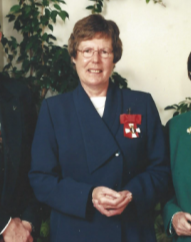Diana Florence Hill
(1943 - 2024)
BSc(Otago), PhD(Otago), FRSNZ CNZM

Diana Florence Hill FRSNZ CNZM
We acknowledge the sad passing of Dr Diana Florence Hill, a Royal Society Fellow since 1997 who has had a distinguised career of research and leadership in DNA sequencing, and in agriculturally-important animal genetics, after first transitioning from nursing in Northland with a Florence Nightingale scholarship to university in Dunedin. Diana gained a BSc in 1970, during which time she was recognised by then PhD student demonstrator, and now RSNZ Fellow Warren Tate, for her superb technical and organisational skills, resulting in her being recruited as a scientific officer by the ‘Father of DNA’ in New Zealand, Professor George Petersen to his research team. Together they did pioneering research on DNA sequencing technologies in difficult circumstances, for example, data analysis before the availability of computers involved generating profiles of newly obtained sequences with cardboard and visually scanning them against the sequence already determined. Together Diana and George worked with Nobel laureate Frederick Sanger in the huge task at that time of sequencing of the 48,502 base pairs of the lambda bacteriophage DNA genome (see - Sanger, Coulson, Hong, Hill and Petersen 1982 J Mol Biol 162, 729-773). For this and her earlier work Diana gained a PhD in 1981. Diana’s partnership with George continued as a very close long-standing research collaboration. They continued working on major DNA sequencing tasks, for example, an intron (1~120kb) of the human Dystrophin gene, the site of deletions that cause Duchenne muscular dystropy, unexpectedly finding it it full of a series of different human repetitious elements.
In 1986 Diana, recognising the enormous potential of elite selection flocks held by the MAF Invermay Agricultural Centre in Mosgiel, built a research team that pioneered single gene identification methods for production traits in sheep and deer. The success of this work led to the establishment of the AgResearch/University of Otago Molecular Biology Unit in 1989, with Diana as the director, a position she held until 1999. This was New Zealand’s first major agri-biotechnology programme, and for its strategically-important work the unit was awarded the RSNZ Silver medal in 1996 for team excellence, the year Diana was awarded a personal professorship at the University of Otago and soon after her RSNZ fellowship. Diana’s stature as a research leader was constantly growing and being recognised, as well as her own awareness of the potential for collaboration between business and science. This led to the establishment of Global technologies (NZ ) Ltd in 1999 that was a joint venture with Silver Fern Farms - Diana was CEO until 2007. She was recognised for her services to agricultural science with a CNZM in 2002.
Over her career Diana Hill contributed to major global advances of a widespread nature, from developing novel DNA and protein analytical methods, to applying molecular genetics to human medicine, farm animal genetics and our extinct species. Her leadership expanded to many advisory groups and boards in the latter part of her career in areas of climate change, international trade, research infrastructure, and biotechnology, and she took part in ministerial delegations to Asia, Europe and South America promoting New Zealand and exploring new opportunities. She kept alive the full breadth of her service to science generally with her chairing of the Marsden Council from 1999-2006.
